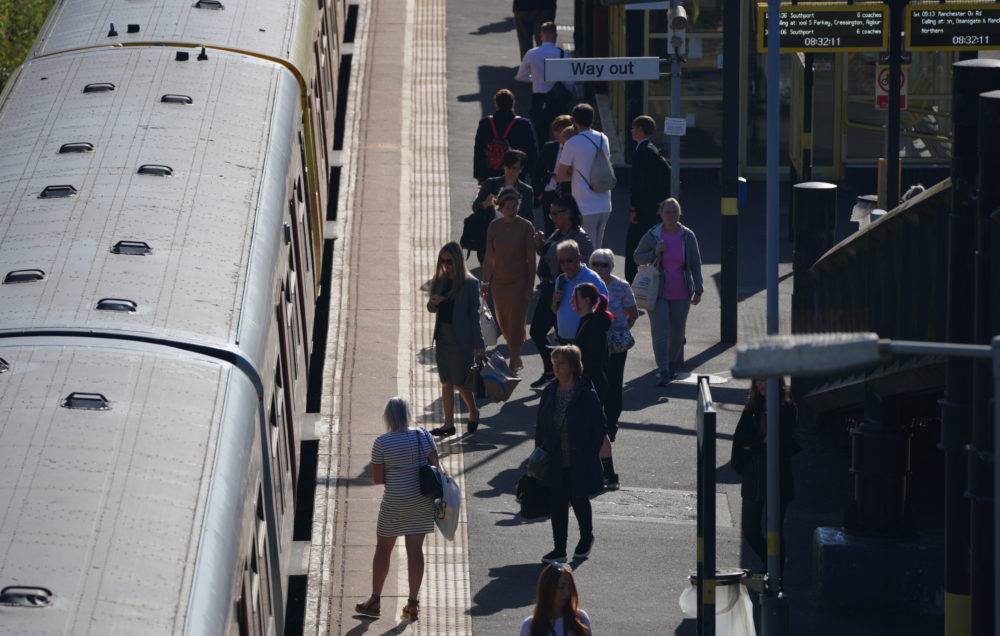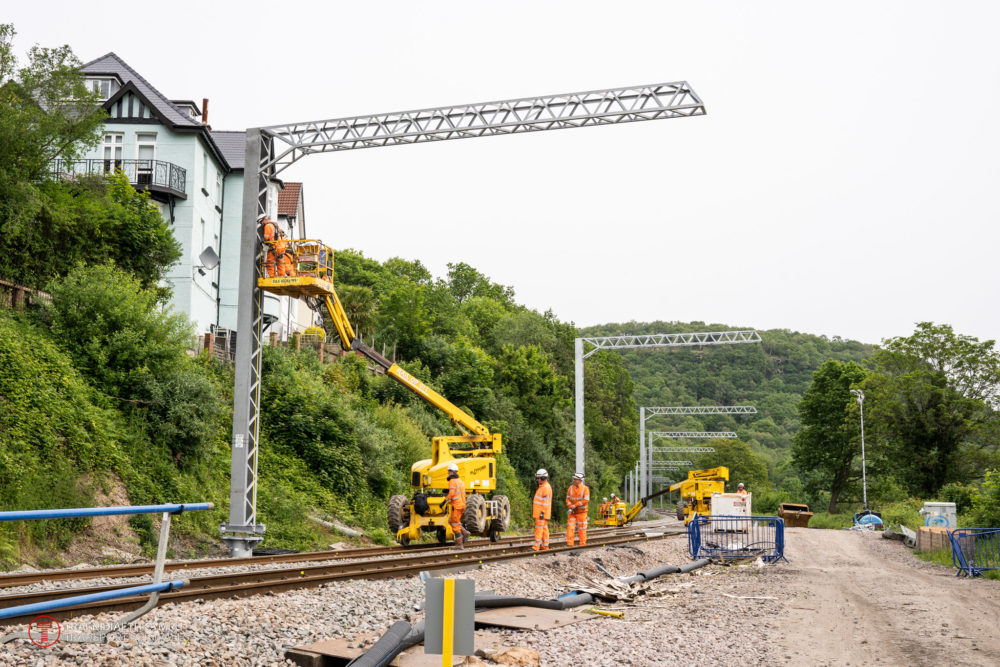Who should run Wales’ railways?

Professor Stuart Cole, CBE. Emeritus Professor of Transport Economics and Policy, Prifysgol de Cymru / University of South Wales
In the King’s Speech, the new Labour government set out its vision for managing the railways in Great Britain.
What is not clear is who will run the railways in Wales (or indeed Scotland). Will it be Great British Railways (GBR) or a mix of TfW and GBR subsidiary train companies?
Great British Railways
Great British Railways, the core of Labour’s railway structure, is a nationalised, arms-length “directing mind” over Britain’s railway infrastructure and services.
Its responsibilities will be:
- long-term strategy.
- day-to-day operational delivery of the railways,
- co-ordination of infrastructure and services (freight and passenger) and
- innovations to improve passenger experience and freight facilities.
The GBR plan sees passenger trains operating through state owned rail divisions which would take over existing private sector contracts as they expire.
Government nationalisation of the railway companies is only part of the story. Train manufacture and all the supply chain companies will continue in the private sector mostly by overseas producers, for example TfW Rail’s CAF trains.
Welsh Government management of the railways
The current Wales domestic railway model has government ownership but without the micro-management exerted by Department for Transport officials over England based rail companies.
In Wales, the Welsh Government sets financial targets and agrees the achievable longer-term strategy with its transport authority Trafnidiaeth Cymru/Transport for Wales (TfW). TfW then sets the budget for government-owned TfW Rail Ltd which is staffed by experienced railway personnel.
They run the trains.
Welsh Government are in the process of preparing a bill to go before the Senedd based on their ‘One Network, One timetable, One ticket’ white paper. This moves to an integrated public transport network first proposed for Wales in the 1980’s by this columnist.

Trains, TrawsCymru buses and regular or demand responsive bus routes would be planned together on a national and local basis. Opportunities to locate new bus interchanges adjacent to railway stations would be an essential part of such planning.
The Wales model better achieves the needs of the bus/train customer. Sometimes we think that is not the case particularly when there are delays; and on rural railways with low frequency services perhaps not fully understood in Cardiff.
Working together
In addition to TfW, rail services in Wales are currently operated by Great Western Railway, Avanti West Coast and Cross Country under contracts with England’s Department for Transport. As part of GBR the promised ‘close working’ with TfW would be essential.
The Labour manifesto analysed in this column said GBR will ‘work with publicly owned rail operators in Wales and Scotland’. This implies that TfW will continue as at present.
In Wales the track (apart from the Cardiff valleys railway), is owned by the UK government through Network Rail as it is in England.
However the King’s Speech made no reference to transferring responsibility for infrastructure from Network Rail to Welsh Government/TfW nor any mention of adequate increases in the block grant to cover that expenditure.
Such a transfer is essential if Wales is to run its own railways. It also provides an opportunity for Welsh Government to decide on road and rail infrastructure expenditure within an integrated transport policy.
People not structure run the railways
The whole operation of the railways depends on its people so government decisions on the regional or market segment structure must be made soon. Uncertainty creates malaise, reluctance to make decisions and merely moving the railway along in its present form.
Restructuring is not a panacea for success. It must be carefully handled.
Customer service is the central core of the railway though some companies are better at it than others; service quality motivation comes from the top. The railways are a retail business and like any supermarket requires entrepreneurial skills to increase passenger numbers and revenue.
Government interference
For the benefit of travellers and railway management the promised ‘no political interference’ has to be forthcoming. A degree of frustration has set in following the micro-management by HM Treasury and DfT.
The UK government’s assertion, echoing that of Welsh Government, is a railway run by railway people.
Over a Pullman dinner with the late Lord Richard Marsh (Minister of Transport 1968 – 1969/Chairman, British Railways Board 1971 – 76) he commented and later repeated on television: “since I took on this job (BRB Chairman) none of our plans, agreed with government, has lasted more than six months”.
This was despite an agreement from Prime Minister Harold Wilson, ‘that I would look at problems objectively and determine the action needed; which did not include continuing Barbara Castle’s ‘slashing of the network to pieces’ (Richard Marsh, Off the Rails, 1978).
One hopes Sir Kier Starmer follows his promised course.
Running Wales’ trains from outside Wales
The impact of GBR effectively taking over rail operations from TfW would return Wales to the position when a Great Britain wide system was in operation. This was not the best format for rail passengers in Wales.
Recent years experiences of Wales being left out does not encourage support for GBR. Funding the Core Valley Lines electrification must change retrospectively under this new UK government.
Of the £1.1 bn capital expenditure to date, HM Treasury has only contributed £125m.

Supporting the Welsh economy and devolution must be proven through increased railway funding from the new Labour government to Welsh Government. Electrification and reduced journey times on the south and north Wales main lines and the north – south Marcher line should now be a priority for discussion between Jo Stevens and Rachel Reeves and
Previous experience of centralised British Railways has left Wales with underinvestment. One can understand HM Treasury post-Covid desire to cut costs though possibly not always understanding the complexity of the railways.
Best case scenario for Wales
Suggestions were made in 1961 (White paper on Financial and Economic Obligations of the Nationalised Industries) to separate out the profitable parts of the railways from those requiring revenue support.
Much of this is linked to socially necessary services on the Cardiff commuter network and rural railways. The concept of cross-subsidy will have to be a key factor in the UK government’s mind.
From Wales point of view the best outcome would be:
- Welsh Government continues to be responsible for the current Wales and Borders railway passenger network including Carmarthen – Manchester, services to Gloucester and Cheltenham and north – south services along the Marcher Line.
- Close working with GBR in England and with the operators whose position the government has not yet specified.
- Transfer of responsibility for rail infrastructure to Welsh Government which will enable our government to allocate funds between road and rail construction.
However, whoever runs Wales’ railways public funding will always be an issue.
Support our Nation today
For the price of a cup of coffee a month you can help us create an independent, not-for-profit, national news service for the people of Wales, by the people of Wales.






“Innovations to improve passenger experience”…
Seriously, have a word with the ‘slim’ controller in Porthmadog…
In my experience UK rail travel is overly expensive and poorly maintained particularly when compared to the rail services in France and Germany. In addition the passenger experience is very poor here with dirty uncomfortable trains, filthy toilets and a total lack of refreshments.
Clearly the privatised package hasn’t worked, public transport should be about public service not rip off profiteering. No country can prosper without good public services particularly public transport. It’s an investment.
It’s also a natural monopoly. It makes sense that it’s in public ownership. I wonder if anyone has done a cost benefit analysis of making public transport free at the point of use and paid for out of general taxation?
The price is paid for not investing in electrification of the railways, as they have done in mainland European – Wales has slow poorly maintained expensive diesel rolling stock.
This must change.
keep things as far away from the bureaucrats as possible!
How about someone who knows how to run a cost effective efficient service!
While Labour has promised to nationalise those train operating companies that are not already in public ownership, as their contracts expire, it has made no such commitment with regard to the rolling stock leasing companies (ROSCO’s) which is another area that hemorrhages money from the system as dividends. Railways in Wales in modern times have never had a fair share of the investment that mainly went to England and the South East and nothing so far suggests that will change. A simple example was at Ruabon Station this afternoon where the victorian planked footbridge to the Chester platform is still… Read more »
I completely agree with your comment about rolling stock companies, they are effectively middle men who don’t produce anything, just creaming off profits and must be brought under public ownership.
The Fella with the Top Hat in Thomas the Tank Engine.
As I understand it, ownership of the ‘core valley lines’ have already been transferred from Network Rail (Minister at Westminster) to the Welsh Government (Minister in the Bae) and this was instrumental in electrification of the valleys, something Westminster dropped from mainline west of Cardiff. The question arises as to whether this is to be ‘handed back’ to London under GBR after the investments are complete, an investment topped up from the Welsh transport budget. Expect Labour to perform the same betrayal on electrification of the North Wales mainline. What you don’t own you cannot control.